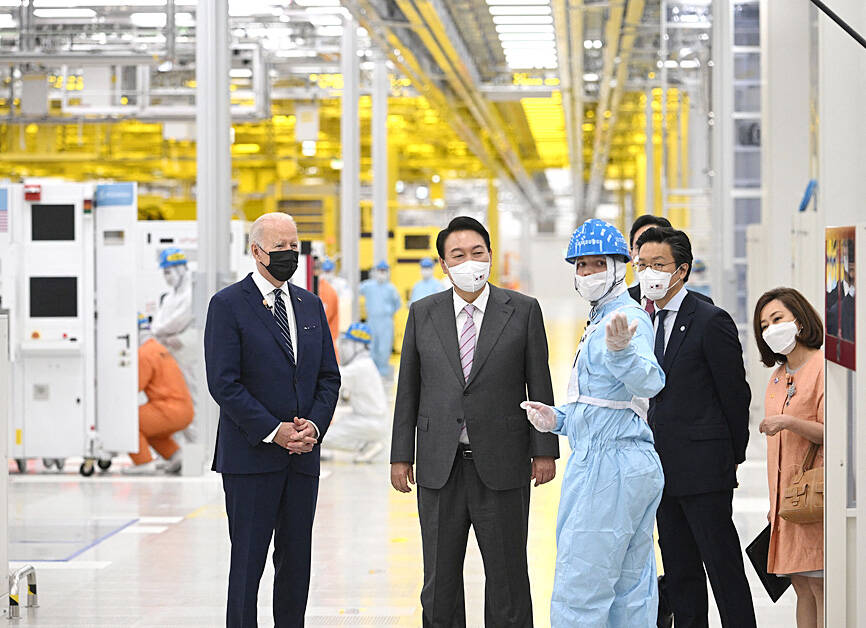The US is asking South Korea to adopt restrictions on semiconductor technology exports to China similar to those Washington has already implemented, another sign that US President Joe Biden’s administration is stepping up efforts to thwart Beijing’s chip ambitions.
US officials want South Korea to restrict the flow of equipment and technologies for making high-end logic and memory chips to China, people familiar with the matter said.
Those include logic chips more advanced than 14-nanometer technology and DRAM beyond 18-nanometers, one of the people said, asking not to be identified because the discussions are private.

Photo: AFP
That would be consistent with a set of measures the US Department of Commerce first announced in 2022.
US officials discussed the issues in depth with the government of South Korean President Yoon Suk-yeol last month, the people said.
While the US is trying to reach an agreement before a G7 summit in the middle of June, South Korean officials are debating whether to satisfy the US request, in part because China remains a key trading partner.
Washington’s request of Seoul has not been detailed before. This comes on top of the new US push to get allies to limit servicing of semiconductor equipment for Chinese firms and restrict exports of spare parts and chip chemicals to China.
Bloomberg News has reported the US pressed allies, including South Korea and Germany, to tighten curbs on China’s access to their technology.
South Korea plays a leading role in producing semiconductors and providing spare parts for chipmaking equipment.
The timeline could slip. South Korea, Japan and US officials are planning to meet in late June to discuss cooperation on advanced technology and supply chains, the sources said.
South Korean officials are wary of potential penalties that export controls might trigger from Beijing when major firms such as Samsung Electronics Co and SK Hynix Inc still operate in China, Seoul’s largest trading partner.
With help from Samsung and Hynix, South Korea makes some of the world’s most advanced logic and memory chips. While its chip equipment suppliers are not as prominent as the US’ Applied Materials Inc or the Netherlands’ ASML Holding NV, local gear makers including Hanmi Semiconductor Co and Jusung Engineering Co still make up an important part of the Asian country’s semiconductor ecosystem.

The US dollar was trading at NT$29.7 at 10am today on the Taipei Foreign Exchange, as the New Taiwan dollar gained NT$1.364 from the previous close last week. The NT dollar continued to rise today, after surging 3.07 percent on Friday. After opening at NT$30.91, the NT dollar gained more than NT$1 in just 15 minutes, briefly passing the NT$30 mark. Before the US Department of the Treasury's semi-annual currency report came out, expectations that the NT dollar would keep rising were already building. The NT dollar on Friday closed at NT$31.064, up by NT$0.953 — a 3.07 percent single-day gain. Today,

‘SHORT TERM’: The local currency would likely remain strong in the near term, driven by anticipated US trade pressure, capital inflows and expectations of a US Fed rate cut The US dollar is expected to fall below NT$30 in the near term, as traders anticipate increased pressure from Washington for Taiwan to allow the New Taiwan dollar to appreciate, Cathay United Bank (國泰世華銀行) chief economist Lin Chi-chao (林啟超) said. Following a sharp drop in the greenback against the NT dollar on Friday, Lin told the Central News Agency that the local currency is likely to remain strong in the short term, driven in part by market psychology surrounding anticipated US policy pressure. On Friday, the US dollar fell NT$0.953, or 3.07 percent, closing at NT$31.064 — its lowest level since Jan.

The New Taiwan dollar and Taiwanese stocks surged on signs that trade tensions between the world’s top two economies might start easing and as US tech earnings boosted the outlook of the nation’s semiconductor exports. The NT dollar strengthened as much as 3.8 percent versus the US dollar to 30.815, the biggest intraday gain since January 2011, closing at NT$31.064. The benchmark TAIEX jumped 2.73 percent to outperform the region’s equity gauges. Outlook for global trade improved after China said it is assessing possible trade talks with the US, providing a boost for the nation’s currency and shares. As the NT dollar

The Financial Supervisory Commission (FSC) yesterday met with some of the nation’s largest insurance companies as a skyrocketing New Taiwan dollar piles pressure on their hundreds of billions of dollars in US bond investments. The commission has asked some life insurance firms, among the biggest Asian holders of US debt, to discuss how the rapidly strengthening NT dollar has impacted their operations, people familiar with the matter said. The meeting took place as the NT dollar jumped as much as 5 percent yesterday, its biggest intraday gain in more than three decades. The local currency surged as exporters rushed to